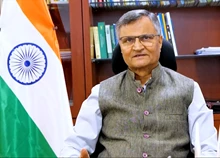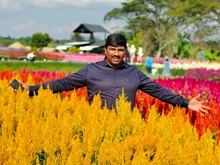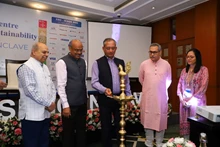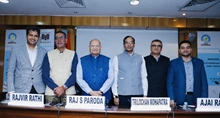
CEO of Global BioAg Linkages and BioAg Innovations, Roger Tripathi, visited today’s session of KJ Chaupal at Krishi Jagran’s Delhi headquarters and shared his experience of working as a global agri consultant. Talking about issues ranging from soil health and food security to doubling farmers’ incomes, Tripathi gave several points to take note of. Follow the photo story to hear what he had to say about the abovementioned subjects.

Don’t forget the farmers.
Tripathi said he believes that if you don’t have respect for the farmers being in the agriculture industry then you are in the wrong business.
Farmers are the biggest risk takers.
Proving this point, he asked whether farmers have weekends and replied that they don’t. He added that farmers cannot predict their income as we do and urged the public that if you are involved in the agriculture industry, be farmer-centric by the heart and not window dressing.

Never talk about extremes.
"I have heard a lot of extreme views from all -over the world. Only organic, only regenerative, chemicals are bad, and so on. I remember we were fogging chemicals back in the 1990s. We were adding potash where it wasn’t even needed. That was wrong and now we are trying to repair the damage. Whatever we do, we have to make sure food safety and food security are equally important. Going extremely organic is good but we have to keep in mind that we need to feed 1.4 billion people. On the other end, going all in on chemical usage with no sense of what you are putting in the soil and the crop is also not good. That’s the reason why I baptized myself completely in bio-agriculture and sustainable agriculture," Tripathi added.
Keep things in balance.
He urges the world to follow sustainable agriculture that is integrated crop management. That means using the law of minimum while adding chemicals and the law of optimization while adding natural products, according to him. It’s good for the consumers as they get safer food while ensuring profitability for the farmers, he concluded.

Take good care of the soil and plant health.
Tripathi advised not only to look at plant health but also to look at soil health. He asked to think of it this way: If you don’t have a healthy gut, you are not healthy. The same thing applies to unhealthy soil and plant health.
Answering M C Dominic’s question about where India’s sustainable agriculture is on a global level, Tripathi said that we should be proud because India’s improvement in the awareness of sustainable agriculture has increased 4 times in the 3-4 years. The awareness level is commendable; however, we cannot ignore the gap at the supply end of things. Now, the country that has made the maximum improvement in sustainable agriculture is Brazil. Other countries should look up to them.
Staying true to the company's motto of 'Locally Global and Global Locally', Tripathi explained that in the service-oriented business, companies usually export from one foreign country to another, acting as localized consultants.
Through Global BioAg Linkages and BioAg Innovations, two of my business ventures, we made a structure where they act like total service-oriented linkages services as the name suggests. With my experience in over 40 countries, I have created a team of local consultancy experts who are proficient in their country. This is what we mean by locally global. I have also seen some really good innovators coming up in India and I am planning to take them to the global level and make them global locally.
Talking about why the doubling farmer’s income initiative failed to achieve the target in the given time period, Tripathi said it is natural to miss deadlines. As individuals, we have some daily targets to achieve as well, however, there are times when we miss them and yet manage to finish them in some time. The same can be applied here. If not by 2022, then 2025 or 2027. What matters is that we are working towards it constantly.










